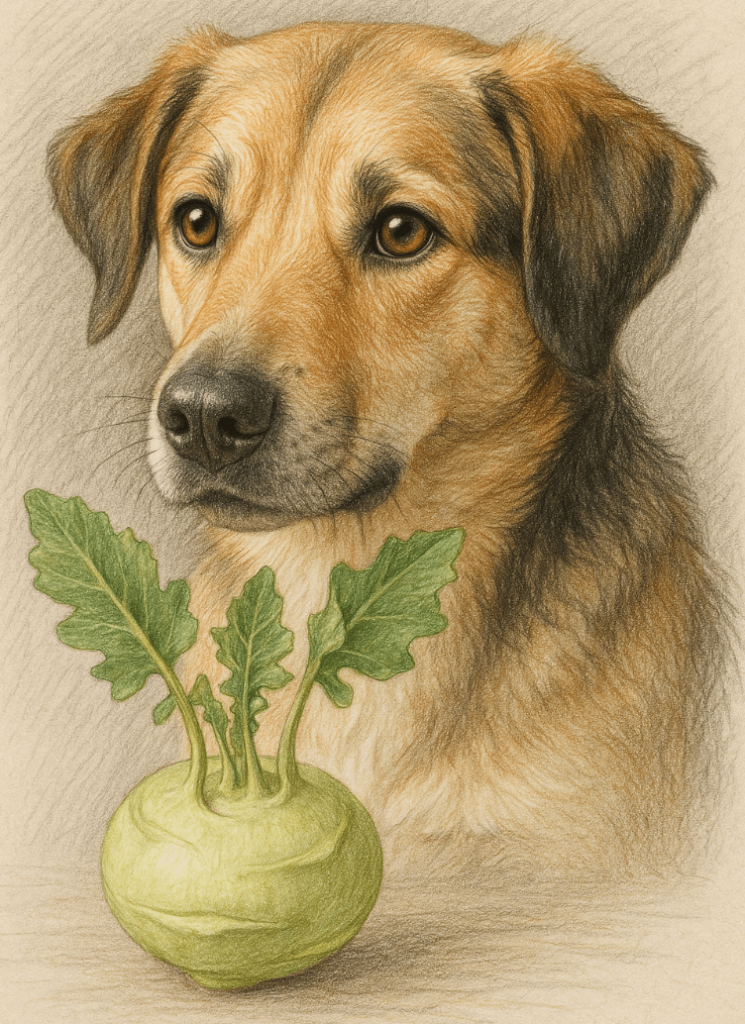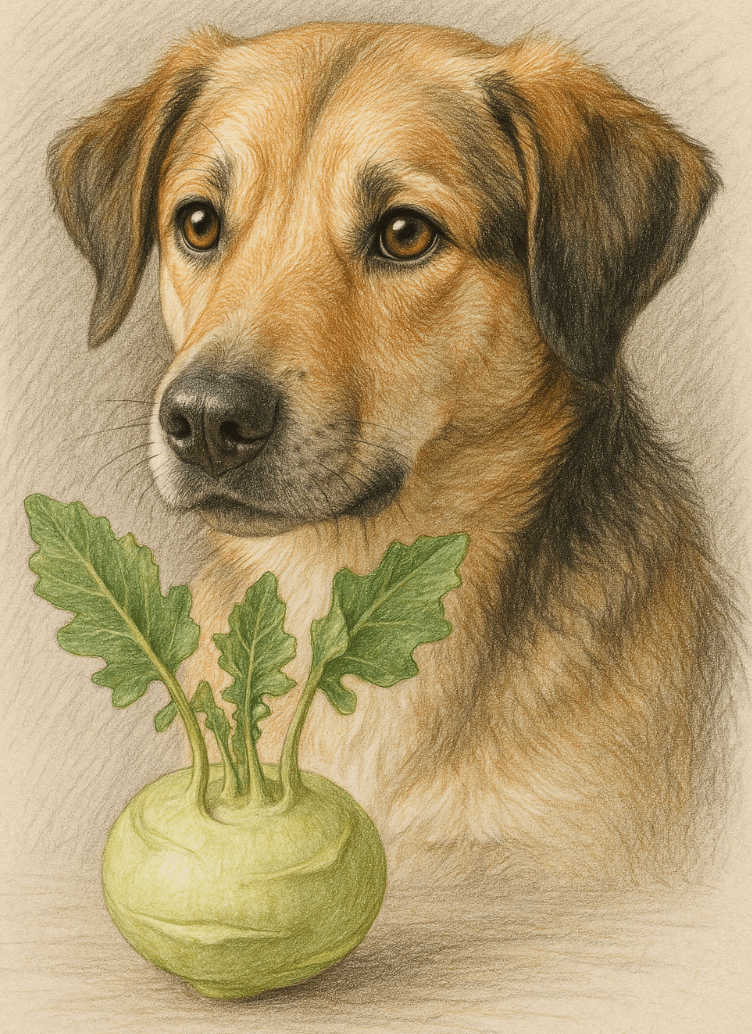Can Dogs Eat Kohlrabi? A Nutritious Treat or Potential Risk?
When it comes to feeding our furry friends, many pet owners are curious about which human foods are safe and beneficial for dogs. Kohlrabi, a versatile and nutrient-rich vegetable, often sparks questions among dog lovers. Is it safe for dogs to eat kohlrabi? Can this crunchy veggie provide health benefits, or does it pose any risks? In this blog post, we’ll explore everything you need to know about feeding kohlrabi to your dog, from its nutritional value to practical tips for safe consumption. Whether you’re looking to diversify your pup’s diet or simply satisfy their curiosity about new flavors, understanding the role of kohlrabi can help you make informed decisions.
Health Benefits of Kohlrabi for Dogs
Kohlrabi is packed with nutrients that can benefit your dog’s overall health when offered in moderation. Here are some key advantages of including this vegetable in your dog’s diet.
Rich in Fiber:
The fiber content in kohlrabi supports healthy digestion and can help regulate bowel movements in dogs.Low in Calories:
As a low-calorie snack, kohlrabi is an excellent option for weight management without compromising on nutrition.High in Vitamin C:
This antioxidant boosts the immune system and helps protect your dog’s cells from damage caused by free radicals.Contains Essential Minerals:
Kohlrabi provides potassium and magnesium, which support muscle function and heart health.Hydration Boost:
With a high water content, kohlrabi helps keep your dog hydrated, especially during warmer months.
Incorporating kohlrabi into your dog’s diet can be a nutritious way to enhance their meals while promoting overall well-being.
Potential Risks of Feeding Kohlrabi to Dogs
While kohlrabi is generally safe for dogs, it’s important to be aware of potential risks to ensure their safety. Moderation and preparation are key to avoiding complications.
Choking Hazard:
Large chunks of raw kohlrabi can pose a choking risk, especially for smaller breeds or dogs prone to gulping food.Digestive Upset:
Overfeeding kohlrabi may lead to gas, bloating, or diarrhea due to its high fiber content.Allergic Reactions:
Although rare, some dogs may experience allergies or sensitivities to new foods like kohlrabi.Pesticide Exposure:
Non-organic kohlrabi may contain harmful chemicals; always wash thoroughly or choose organic options.Difficulty Digesting Raw Vegetables:
Some dogs struggle to digest raw veggies, so lightly steaming kohlrabi may make it easier on their stomachs.
By understanding these risks, you can take steps to minimize potential issues and ensure your dog enjoys kohlrabi safely.
Check this guide 👉Can Dogs Eat Ghee? Best 7 Expert Tips!
Check this guide 👉Can Dogs Eat Mochi? Best 7 Expert Tips!
Check this guide 👉Can Dogs Eat Dumplings? Best 7 Expert Tips!

Safe Ways to Serve Kohlrabi | Risks to Avoid When Feeding Kohlrabi |
|---|---|
Chop into small, bite-sized pieces | Feeding large chunks that could cause choking |
Steam lightly for easier digestion | Offering excessive amounts leading to digestive upset |
Mix with regular dog food as a topping | Using salt, spices, or seasonings that harm dogs |
Serve plain without added oils or butter | Ignoring signs of allergic reactions or discomfort |
Introduce gradually to test tolerance | Feeding spoiled or improperly washed kohlrabi |
How to Introduce Kohlrabi to Your Dog’s Diet
Introducing kohlrabi to your dog’s diet should be done carefully to avoid overwhelming their system. Follow these steps to ensure a smooth transition.
Start Small:
Begin with a tiny piece to gauge your dog’s reaction and monitor for any adverse effects.Choose Fresh, Organic Kohlrabi:
Opt for fresh, pesticide-free produce to minimize exposure to harmful chemicals.Prepare Properly:
Wash thoroughly, peel if necessary, and cut into small, manageable pieces to prevent choking.Cook Lightly (Optional):
Steaming or boiling kohlrabi slightly can make it softer and easier to digest for sensitive dogs.Observe for Allergies or Sensitivities:
Watch for symptoms like itching, vomiting, or diarrhea after introducing kohlrabi.
Taking these precautions ensures a safe and enjoyable experience for your dog as they try this new vegetable.
Signs Your Dog May Not Tolerate Kohlrabi
Even though kohlrabi is generally safe, some dogs may not tolerate it well. Recognizing warning signs early can help you address any issues promptly.
Vomiting or Diarrhea:
These symptoms indicate digestive distress, often caused by overfeeding or difficulty processing raw vegetables.Excessive Gas or Bloating:
High fiber content can lead to uncomfortable gas buildup in some dogs.Loss of Appetite:
If your dog refuses to eat after trying kohlrabi, it may signal an intolerance or dislike.Itching or Skin Irritation:
Allergic reactions can manifest as redness, itching, or swelling around the face or paws.Lethargy or Discomfort:
Unusual tiredness or signs of pain may suggest an adverse reaction to the vegetable.
If you notice any of these signs, discontinue feeding kohlrabi and consult your veterinarian for further guidance.
Common Mistakes to Avoid When Feeding Kohlrabi to Dogs
Feeding kohlrabi to your dog requires attention to detail to avoid mistakes that could harm their health. Here are some common errors to steer clear of.
Overfeeding:
Too much kohlrabi can upset your dog’s stomach and disrupt their balanced diet.Adding Harmful Seasonings:
Salt, spices, or butter can irritate your dog’s digestive system and should always be avoided.Ignoring Portion Sizes:
Large portions increase the risk of choking and digestive issues—always serve bite-sized pieces.Feeding Spoiled Produce:
Never give your dog old or moldy kohlrabi, as it can cause illness or toxicity.Skipping the Introduction Phase:
Introducing kohlrabi suddenly without testing for allergies or intolerances can lead to unexpected reactions.
Avoiding these mistakes ensures a safer and healthier experience for your dog.
Alternative Vegetables Safe for Dogs
If your dog doesn’t enjoy kohlrabi or has trouble digesting it, there are plenty of other vegetables that are safe and nutritious alternatives.
Carrots:
Crunchy and low-calorie, carrots are a great source of beta-carotene and fiber.Green Beans:
Packed with vitamins and fiber, green beans make an excellent low-calorie snack.Zucchini:
Mild in flavor and hydrating, zucchini is easy to digest and rich in nutrients.Sweet Potatoes:
Cooked sweet potatoes provide vitamins A and C, supporting skin and immune health.Cucumbers:
Low in calories and high in water content, cucumbers are refreshing and hydrating.
These alternatives allow you to diversify your dog’s diet while ensuring they receive essential nutrients.
Fun Ways to Incorporate Kohlrabi into Your Dog’s Meals
Adding kohlrabi to your dog’s diet doesn’t have to be boring—get creative with these fun and tasty ideas.
Kohlrabi Puree:
Blend cooked kohlrabi into a puree and mix it with their regular food for added nutrition.Frozen Kohlrabi Treats:
Freeze small cubes of steamed kohlrabi for a refreshing summer snack.Kohlrabi Chips:
Thinly slice and dehydrate kohlrabi to create crunchy, grain-free chips.Topped Kibble:
Sprinkle finely chopped raw or steamed kohlrabi over their kibble for extra flavor and texture.DIY Veggie Mix:
Combine kohlrabi with other dog-safe veggies like carrots and zucchini for a colorful medley.
These creative ideas make kohlrabi an exciting addition to your dog’s mealtime routine.
Frequently Asked Questions About Feeding Kohlrabi to Dogs
Is kohlrabi safe for all dogs?
While most dogs can eat kohlrabi, individual tolerances vary. Always introduce it slowly and monitor for reactions.
Can I feed my dog raw kohlrabi?
Yes, but ensure it’s chopped into small pieces and observe how your dog handles it.
How much kohlrabi can I give my dog?
Limit kohlrabi to occasional treats, making up no more than 10% of their daily caloric intake.
Are kohlrabi leaves safe for dogs?
Yes, the leaves are edible and nutritious, but serve them in moderation to avoid digestive upset.
What should I do if my dog accidentally eats too much kohlrabi?
Monitor for symptoms like vomiting or diarrhea and contact your vet if concerns arise.
Making Kohlrabi a Safe and Healthy Addition to Your Dog’s Diet
Kohlrabi can be a nutritious and refreshing treat for dogs when introduced thoughtfully and served in moderation. Its rich fiber content, vitamins, and minerals offer numerous health benefits, while careful preparation minimizes potential risks. By observing your dog’s response and consulting your veterinarian if needed, you can confidently incorporate kohlrabi into their diet. Remember, every dog is unique, so what works for one may not suit another. With patience and attention to detail, you can provide your furry friend with a varied and wholesome diet that keeps them happy and healthy.
Do Cats Have Taste Buds? Best 7 Expert Tips! – Discover how cats experience flavors and why their taste is so unique.
Do Dogs Have Taste Buds? Best 7 Expert Tips! – Discover how dogs experience taste, their preferences, and what it means for their diet and health.
Can Cats Taste Sweet? Best 7 Expert Tips! – Discover why cats can’t taste sweetness, how it affects their diet, and tips to keep them healthy and happy.
Can Dogs Taste Sweet? Best 7 Expert Tips! – Discover how dogs perceive sweetness, which foods are safe, and tips to manage their sweet cravings responsibly.





